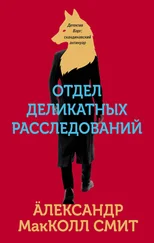Alexander McCall Smith is the author of over eighty books on a wide array of subjects. For many years he was Professor of Medical Law at the University of Edinburgh and served on national and international bioethics bodies. Then in 1999 he achieved global recognition for his award-winning series The No. 1 Ladies’ Detective Agency, and thereafter has devoted his time to the writing of fiction, including the 44 Scotland Street and Corduroy Mansions series. His books have been translated into forty-six languages. He lives in Edinburgh with his wife Elizabeth, a doctor.
By Alexander McCall Smith
The No. 1 Ladies’ Detective Agency Series
The No. 1 Ladies’ Detective Agency
Tears of the Giraffe
Morality for Beautiful Girls
The Kalahari Typing School for Men
The Full Cupboard of Life
In the Company of Cheerful Ladies
Blue Shoes and Happiness
The Good Husband of Zebra Drive
The Miracle at Speedy Motors
Tea Time for the Traditionally Built
The Double Comfort Safari Club
The Saturday Big Tent Wedding Party
The Limpopo Academy of Private Detection
The Minor Adjustment Beauty Salon
The Handsome Man’s De Luxe Café
The Isabel Dalhousie Novels
The Sunday Philosophy Club
Friends, Lovers, Chocolate
The Right Attitude to Rain
The Careful Use of Compliments
The Comfort of Saturdays
The Lost Art of Gratitude
The Charming Quirks of Others
The Forgotten Affairs of Youth
The Uncommon Appeal of Clouds
The 44 Scotland Street Series
44 Scotland Street
Espresso Tales
Love Over Scotland
The World According to Bertie
The Unbearable Lightness of Scones
The Importance of Being Seven
Bertie Plays the Blues
Sunshine on Scotland Street
Bertie’s Guide to Life and Mothers
The Corduroy Mansions Series
Corduroy Mansions
The Dog Who Came in from the Cold
A Conspiracy of Friends
The von Igelfeld Entertainments
The 2½ Pillars of Wisdom
Unusual Uses for Olive Oil
La’s Orchestra Saves the World
The Forever Girl
COPYRIGHT
Published by Little, Brown
978-1-4055-2060-7
All characters and events in this publication, other than those clearly in the public domain, are fictitious and any resemblance to real persons, living or dead, is purely coincidental.
Copyright © Alexander McCall Smith 2014
The moral right of the author has been asserted.
All rights reserved. No part of this publication may be reproduced, stored in a retrieval system, or transmitted, in any form or by any means, without the prior permission in writing of the publisher.
The publisher is not responsible for websites (or their content) that are not owned by the publisher.
LITTLE, BROWN
Little, Brown Book Group
100 Victoria Embankment
London, EC4Y 0DY
www.littlebrown.co.uk
www.hachette.co.uk
The Handsome Man’s De Luxe Café
Table of Contents
About the Author
By Alexander McCall Smith
COPYRIGHT
Dedication
Chapter One : The Women of Botswana Now Fly Aeroplanes
Chapter Two : People with Very Long Noses
Chapter Three : The Only Purring Baby in Botswana
Chapter Four : Electric Dogs and Other Things
Chapter Five : Men Often Fail to Take Finer Points
Chapter Six : I Am Not Rude Any More
Chapter Seven : Pilates with Cake
Chapter Eight : Where Fashionable People Go
Chapter Nine : Botswana Was a Good Place
Chapter Ten : Cool Jules Is on the Case
Chapter Eleven : Ninety-eight Per Cent
Chapter Twelve : I Did Not Come About a Cat
Chapter Thirteen : The Dish of Yesterday
Chapter Fourteen : Tiny Points of Light
Chapter Fifteen : He May Sell Stationery, But He Is Really a Hero
Chapter Sixteen : You Don’t Want Handsome Men
This book is for Alan and Sally Merry
Chapter One
The Women of Botswana Now Fly Aeroplanes
Precious Ramotswe, creator and owner of the No. 1 Ladies’ Detective Agency, friend of those who needed help with the problems in their lives, and wife of that great garagiste , Mr J. L. B. Matekoni, felt that there were broadly speaking two sorts of days. There were days on which nothing of any consequence took place – these were in a clear majority – and then there were those on which rather too much happened. On those uneventful days you might well wish that a bit more would happen; on days when too much occurred, you longed for life to become a bit quieter.
It had always been like that, she thought, and always would be. As her father, the late Obed Ramotswe, often said: there are always too many cattle or too few – never just the right number. As a child she had wondered what he meant by this; now she knew.
Both sorts of day started in much the same way, with the opening of her eyes to the familiar dappled pattern made by the morning sun on the ceiling above her bed, an indistinct dancing of light, faint at first, but gradually becoming stronger. This intrusion of the dawn came from the gap between the curtains – the gap that she always intended to do something about, but did not because there were more pressing domestic tasks and never enough time for everything you had to do. And as long as curtains did their main job, which was to prevent nosy people – unauthorised people , as Mma Makutsi would call them – from looking into her bedroom without her permission, then she did not have to worry too much about their not meeting in the middle.
She woke up at more or less the same time each morning, thought for a while about getting up, and then rose, leaving Mr J. L. B. Matekoni still deeply asleep on his side of the bed, dreaming about the sort of things that mechanics, and men in general, dream about. Women, she felt, should not enquire too closely as to what these things were, as they were not the sort of things that women liked very much – engines and football, and so on. A friend had once said to her that men did not dream about things like that – that this was just what women wanted men to dream about, while men, in reality, dreamed about things that they would never reveal. Mma Ramotswe doubted this. She had asked Mr J. L. B. Matekoni one morning what he had dreamed about and he had replied: ‘the garage’, and if this were not proof enough, on another occasion, when she had woken him from the tossing and turning of a nightmare, he had replied to her question about the content of the bad dream by saying that it had all been to do with a seized-up gearbox. And then there was Puso, their foster child, who had told her that his dreams were about having a large dog that chased away the bullies at school, or about finding an old aeroplane in the back yard and fixing it so that it could fly, or about scoring a goal for Botswana in a soccer match against Zambia, with the whole stadium rising to its feet and cheering him. That, she thought, settled that. Perhaps there were some men who dreamed about other things, but she felt that this was not the case for most men.
Once up and about, clasping her cup of freshly brewed redbush tea in her hand, she took a walk around the garden, savouring the freshness of the early-morning air. Some people said that the air in the morning had no smell; she thought they were wrong, for it smelled of so many things – of the acacia leaves that had been closed for the night and were now opening at the first touch of the morning sun; of a wood fire somewhere, just a hint of it; of the wind, and the breath that the wind had, which was dry and sweet, like the breath of cattle. It was while she was standing there that she decided whether the day would be one in which things might happen; it had something to do with the way she felt when she considered the day ahead. And most of the time she was right, although sometimes, of course, she could be completely wrong.
Читать дальше

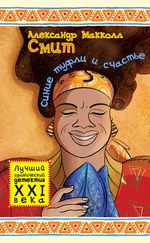

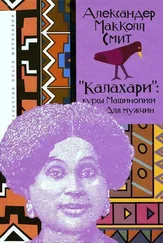
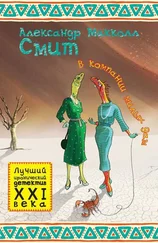
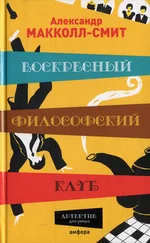

![Александр Макколл Смит - Отдел деликатных расследований [litres]](/books/397661/aleksandr-makkoll-smit-otdel-delikatnyh-rassledova-thumb.webp)
